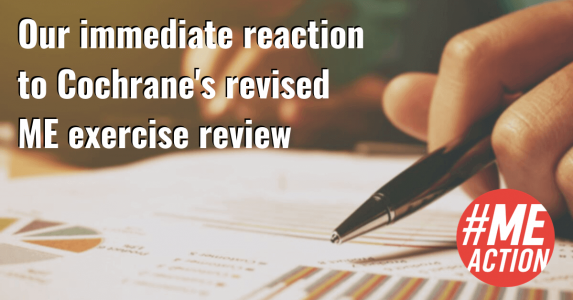The revised Cochrane Review on ME/CFS was released today, October 2, 2019. We will share a more in-depth analysis shortly. However, we must immediately emphasize that #MEAction does not support graded exercise therapy due to serious risk of harms to people with ME, and that we are deeply concerned about the conclusions of this review.
The report’s conclusion is highly problematic:
“Exercise therapy probably has a positive effect on fatigue in adults with CFS compared to usual care or passive therapies. The evidence regarding adverse effects is uncertain. Due to limited evidence it is difficult to draw conclusions about the comparative effectiveness of CBT, adaptive pacing or other interventions. All studies were conducted with outpatients diagnosed with 1994 criteria of the Centers for Disease Control and Prevention or the Oxford criteria, or both. Patients diagnosed using other criteria may experience different effects.”
AT THE SAME TIME, Cochrane’s editor-in-chief issued a statement saying that Cochrane plans to undertake a NEW review of the ME/CFS evidence at the beginning of 2020, and that it plans to review its protocol for the review, which will involve consulting with an independent advisory group that will include patient-advocacy groups. (Read her full statement here.)
The review states:
- “We are uncertain about the risk of serious adverse reactions [in graded exercise therapy] because the certainty of the evidence is very low.”
- “All [studies] had a high risk of performance and detection bias.”
- “It is important to note that the evidence in this review is from people diagnosed with 1994 criteria of the Centers for Disease Control and Prevention or the Oxford criteria. People diagnosed using other criteria may experience different effects.”
- Almost all outcomes included in the review are given a ‘Certainty of the Evidence’ grade of low or very low.
How this poor evidence led Cochrane to conclude that “exercise therapy probably has a positive effect on fatigue in adults with CFS” is unknown.
Our added points:
- The review only looks at Randomised Control Trials (RCTs) and doesn’t account for patient surveys that show the high rates of deterioration following exercise therapy for ME.
- While there are several studies showing that exercise does harm people with ME, we do acknowledge there is not systematic evidence regarding the harms of exercise therapies. Therefore, we consider patient surveys indicating GET harms people with ME, and the growing literature around abnormal responses to exercise, the best available evidence.
You can learn more about the effects of graded exercise therapy and the effects on people with ME here:
- #MEAction’s white paper: People with Myalgic Encephalomyelitis Show Deleterious Effects following GET and CBT
http://www.meaction.net/wp-content/uploads/2019/08/Effects-of-GET-CBT-in-people-with-ME.pdf
- A recent survey of over 2.200 people confirmed that graded exercise therapy (GET) is harming a large majority of people with ME receiving this treatment in the UK.
http://www.meaction.net/wp-content/uploads/2019/08/Effects-of-GET-CBT-in-people-with-ME.pdf - Reanalysis of the PACE trial shows GET and CBT are ineffective https://www.meaction.net/2018/03/23/reanalysis-of-pace-trial-shows-get-and-cbt-are-ineffective/
- Recap from David Tuller of the Cochrane review saga http://www.virology.ws/2019/09/24/whats-up-with-cochranes-exercise-review/
- Cochrane Review on ME/CFS: http://www.meaction.net/wp-content/uploads/2019/08/Effects-of-GET-CBT-in-people-with-ME.pdf





4 thoughts on “Cochrane Releases Problematic Review on ME/CFS”
not again! I am litterally nearly dead after ” decades of severe illness and they will never stop! I had get and psychiatrists and psychologist but declined rappidly. It is a slap in my bedridden face that they start over again. and here in belgium, we are allready psychosomatic, falls beliefs, it is allready get and cbt and I can rot in hell in bed. I even must commit suicide if I can eat no more. no other options or get and cbt but I can NO MORE!
Hi Konijn,
We are fighting hard to combat this psychosomatic narrative, based on NO evidence, and we are certainly making wins, and we will continue to fight.
Please take good care of yourself. If you ever need some support, you can find community and empathy on our Living with ME Facebook page: https://www.facebook.com/groups/211058135999671/
Also, it looks like there actually might be some good news coming from Cochrane. The editor wrote that they are planning to undertake a NEW review of the evidence at the beginning of 2020, and is planning to involve the patient community – this is really hopeful!
https://www.cochrane.org/news/publication-cochrane-review-exercise-therapy-chronic-fatigue-syndrome
Hi konijn there is an #MEAction European Union (EU) Facebook group.
You have probably come across this EU Parliamentary petition for funding for biomedical research – petition no 0204/2019
I think you are from Belgium – the petitioner is too
Hi konijn, you are possibly aware of Evelien’s petition for EU funding for biomedical research for ME. Here is a link to an update on the petition:
https://www.meaction.net/2020/02/05/the-eu-committee-on-petitions-is-preparing-a-resolution-on-me/?unapproved=88892&moderation-hash=32e5163ac9615d9fc47a95890c9640b0#comment-88892
Evelien’s from Belgium too!
There is an EU facebook group linked to the petition #MEAction European Union (EU)
Comments are closed.